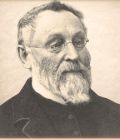Acrid, corrosive moisture from the rectum (Paeon.) (Br.).
Discharge of blood from the rectum (Hamamelis, Ipecac., Acid nitricum, Phosphorus) (Br.).
Excoriation of anus (Aloe., Mercurius, Sulphur) (Br.).
Stools of foul blood and mucus (Hamamelis, Merc-C., Acid nitricum, Sulphur) (Bt.).
Lymphatic swellings, with suppurations and burning pains (Ars-I., Lachesis).
Morning leucorrhoea, discharges very acrid, excoriating the parts (G.).
Aphthae of the vulva, with much itching, heat and redness (Calcarea, Kreosotum, Graphites, Acid nitricum, Sulphur) (G.).
Extraordinary rush of voluptuous thoughts (Cantharis, Hyoscyamus, Phosphorus, Platina) (G.).
Frequent emissions (Dioscorea, Kali-P., Nux vomica, Acid phosphoricum., Sulphur) (Bt.).
Onanism during sleep (Camph., Platina, Thuja) (G.).
Icy coldness of the parts; they have a livid, purple look (gangrena senilis) (Bt.).
AGGRAVATION:
In the morning; at night; before falling asleep; from the abuse of quinine and mercury; on rising from the bed; while walking in the open air., from butter, pork or fat food; from singing or reading aloud; and in warm, damp weather.
AMELIORATION:
From eructations; from being fanned; in the open air; from loosening the clothing around the waist; and lying down.
RELATIONSHIP:
complementary: China and Kali carb.
ANTIDOTES: Arsenicum, Camph., Coffea, Lachesis, and Sp-Nitr-D., Carbo vegetabilis, itself ANTIDOTES; China, Lachesis, and Mercurius
Compare: Ant-T., Arsenicum, Calcarea, Carbo-A., China, Ferrum, Graphites, Kali carb., Lachesis, Lycopodium, Mercurius, Natrum muriaticum, Nux vomica, Phosphorus, Acid phosphoricum., Secale, Sepia, Sulphur, and Veratrum

